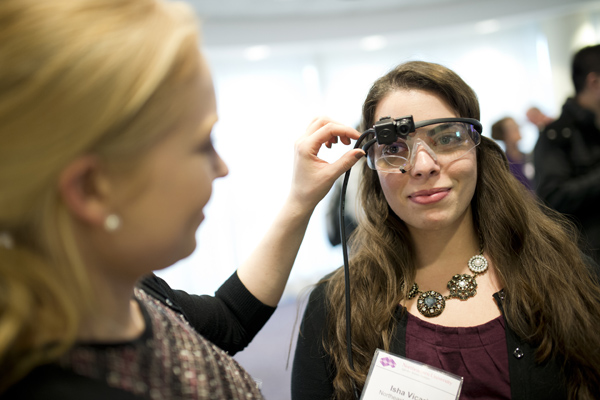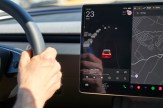Your iPhone gets emotional

The 2013 film Her tells the story of a lonely man falling in love with his mobile phone’s artificially intelligent operating system. It recently earned a Golden Globe for Best Screenplay and received five Oscar nominations, including Best Picture.
The movie isn’t a rumination on the future but rather on the present, according to Andrew Zolli, curator and executive director at Poptech, a global community of innovators working together to effect change. Speaking at Northeastern on Friday, Zolli explained that the notion of forming emotional relationships through and with our technologies has only recently become “a plausible premise for a cultural dialogue.”
“This film could not be made at any other time. It only could be made now,” Zolli said.
Zolli’s talk to a packed audience at the Raytheon Amphitheater kicked off “New Vistas in Emotion and Technology,” the fourth event in a series hosted by Northeastern University’s Affective Science Institute. It brought together researchers from Northeastern and beyond to engage in the broader dialogue that Her took to the silver screen.
In a keynote address, Facebook engineering director Arturo Bejar discussed how the multi-billion user online social network is leveraging affective science to deliver a more valuable product. For instance, his team’s intensive field research yielded a new way for young users to report cyberbullying and provide useful resources to help deal with the problem offline.

Local public radio host Meghna Chakrabarti hosted a discussion with Facebook engineering director Arturo Bejar. Photo by Brooks Canaday.
In opening remarks, Lisa Feldman Barrett, Northeastern University Distinguished Professor of Psychology and a co-director of the Affective Science Institute, said the event would highlight “ways that we can bridge affective science and technological advancement to the betterment of both academia and scientific interests in industry.” For, as speakers throughout the day explained, not only is emotion being injected into our operating systems, our operating systems are reciprocating with new ways for human individuals to engage with one another. Simultaneously, other new technologies are allowing researchers to probe the depths of emotion in novel ways.
Some of those technologies were on display during an interactive demo session, in which visitors could try out ambulatory brain imaging caps, mobile eye-tracking devices, and video games that pay close attention to the emotions and affective realities of both players and virtual characters.
The minds behind most of these projects discussed their research throughout the day during panel discussions with experts from a range of disciplines including game design, psychology, and health sciences.
Northeastern University professor Stacy Marsella, who has joint appointments in the College of Computer and Information Science and the College of Science, presented his work on developing more realistic virtual humans. His team is creating algorithms that detect emotion in snippets of text and speech and use that information to reliably confer facial expressions and hand gestures to computerized characters.
Matthew Goodwin, a Northeastern University professor of health science and computer and information science, discussed how his lab is embedding technologies into the homes and classrooms of children with autism. This is of particular importance in this area of research, since the traditional experimental environment can be unsettling to subjects and thus skew results.
Northeastern psychology professor David DeSteno showed how his team is using robots to delve into how humans relate to one another in ways never before possible. DeSteno is also co-director of the ASI and helped organize the conference.
Stephen W. Director, provost and senior vice president for academic affairs, said projects such as these exemplify Northeastern’s focus on interdisciplinary, use-inspired research that addresses societal challenges, particularly in the areas of health, security, and sustainability. Bringing together emotion science and technological advancements, he said, “epitomizes one of things we at Northeastern like to do.”





